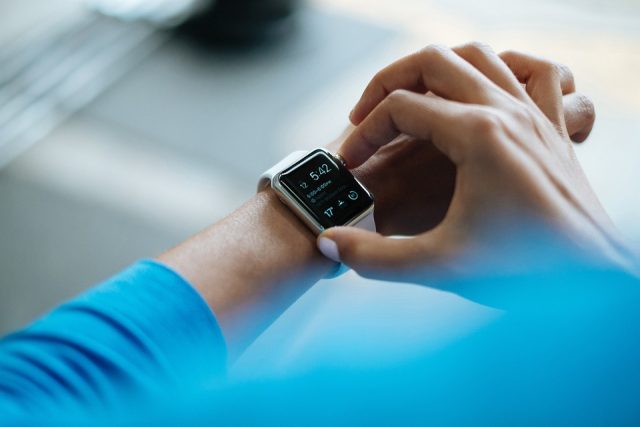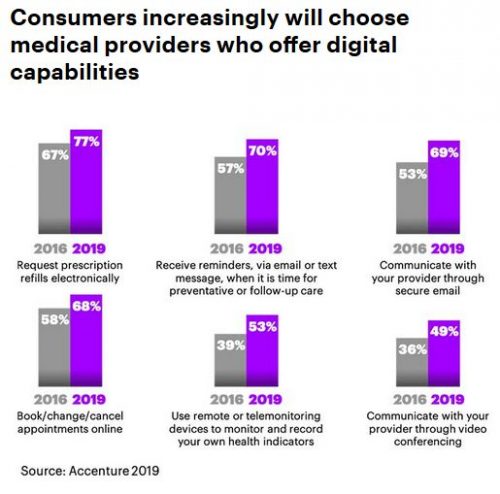This article is written by Jessica Smith.
Digital healthcare is a concept specifically designed to make use of technology in developing methods that can transform addressing health issues. It is boosting the functioning of the health care industry to a whole new level by creating a convenient platform for patients and health workers.
Information technology is enabling management of the entire system, be it keeping records, personalizing patients, enhance staff capability, stay connected with every stakeholder and cater to several sections of health troubles. These factors are benefitting for both parties.
Here are 5 ongoing digital health trends that are transforming the health sector.
-
Forms of Digital Health Take
Currently, there are usages of artificial intelligence (AI), mHealth, Telemedicine in health care which are empowering the quality of services in the industry. Introduction of AI has helped conduct diagnosis, processing of adapted prescriptions by enabling machines to understand the complications of each patient. This technology assists health professionals to detect diseases accurately, one example being able to detect diabetic retinopathy.
Mhealth or mobile digital healthcare allows easy access to information directly over the phone, email or even a message. We all know the number of patients waiting to be treated is massive. To make communication easier for all, mHealth and telemedicine have been created for scrutinizing medical issues of all forms and passing on the information right to a patient’s mobile phones. People from remote areas can probably get in touch with top health specialist sitting in a different corner of the country through telehealth technology. Virtually seeking aid shall save time, cost of traveling and provide privilege of availing early treatment for life-threatening diseases.
-
Demand for digital health services
A survey conducted by Accenture shows a higher percentage of digital health service dependency in 2019 as compared to 2016. If every health service provider looks forward to providing digitally scrutinized reports, it will be a benefit for us (patients) to gain more accuracy. Furthermore, it would help personalize services according to individual patient’s needs. Point no 1 (above) and 5 (below) basically sums up the advantages of digital health service dependency.
-
Cloud Computing and Blockchain
Digital tools have revolutionized in availing better services and also augment the quality. The cloud computing systems have enabled hospitals to keep patient records protected besides helping go paperless. You do not have to worry about your data getting lost or misplaced. Also, the earlier system of transmitting information about a patient’s medical history every time one visits a new physician is discarded today. Here blockchain is implemented, which enables collecting information through an accessible ledger. This means the trouble of carrying a huge number of files to doc visits is no longer required. Phew, to that!
-
Digital health technologies making a patient-centric approach possible
Adopting a patient-centric approach for offering services works best in treating diseases. Patients suffering from similar illness may react differently to similar prescribed medicines. DNA health test is a revolutionary introduction helping to know our genes better which basically dominates our entire health and fitness. Genetic disorders are inherited from family. What is leading to poor growth or slow health recovery can be dealt with by knowing what lies underneath. An early diagnosis can go a long way in dealing with any probable illness.
In addition, Nutrigenomics is yet another concept potentially changing lives by researching the entire functioning of genes and reaction to food and medications. Our body is largely dependent on nutrition which includes food. This area of study is emerging to be the base of health care service and dietary guide. Different bodies have different requirements of nutrition depending on the genetic type.

-
Wearable Technology
This digital trend in the healthcare industry has been recently introduced and emerging to be the handiest tool for identifying health signals. This is one practical device, helping record instantaneous patient data with aid of its sensory feature and indicates early warnings. It offers a chance to customize treatment as per the patient’s needs. There are smart watches, glucose monitors, diagnostic wearables and cardiac monitors witnessing growing usage every day.
Digital development in the healthcare sector is wide enough to incorporate more innovations in the near future. These tools are to provide transparency in the medical world for increasing patient outcome and simultaneously promoting a healthy lifestyle. Pharmaceutical companies are on their toes to promote trends being accepted by patients and are proving to boost the market as well as health services.
Author Bio: Jessica is an avid reader who enjoys getting lost in the world of books.Holding on to her passion for fitness, She Believes that a healthy diet is a key to healthy living.
If you enjoyed reading this article, you might also like:


